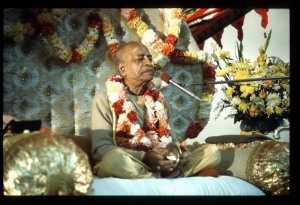CC Adi 7.34 (1975)

A.C. Bhaktivedanta Swami Prabhupada
Below is the 1996 edition text, ready to be substituted with the 1975 one using the compile form.
TEXT 34
- cabbiśa vatsara chilā gṛhastha-āśrame
- pañca-viṁśati varṣe kaila yati-dharme
SYNONYMS
cabbiśa—twenty-four; vatsara—years; chilā—He remained; gṛhastha—householder life; āśrame—the order of; pañca—five; viṁśati—twenty; varṣe—in the year; kaila—did; yati-dharme—accepted the sannyāsa order.
TRANSLATION
Śrī Caitanya Mahāprabhu remained in householder life for twenty-four years, and on the verge of His twenty-fifth year He accepted the sannyāsa order.
PURPORT
There are four orders of spiritual life, namely, brahmacarya, gṛhastha, vānaprastha and sannyāsa, and in each of these āśramas there are four divisions. The divisions of the brahmacarya-āśrama are sāvitrya, prājāpatya, brāhma and bṛhat, and the divisions of the gṛhasthāśrama are vārtā (professionals), sañcaya (accumulators), śālīna (those who do not ask anything from anyone) and śiloñchana (those who collect grains from the paddy fields). Similarly, the divisions of the vānaprastha-āśrama are vaikhānasa, vālakhilya, auḍumbara and pheṇapa, and the divisions of sannyāsa are kuṭīcaka, bahūdaka, haṁsa and niṣkriya. There are two kinds of sannyāsīs, who are called dhīras and narottamas, as stated in Śrīmad-Bhāgavatam (SB 1.13.26-27). At the end of the month of January in the year 1432 śakābda (A.D. 1510), Śrī Caitanya Mahāprabhu accepted the sannyāsa order from Keśava Bhāratī, who belonged to the Śaṅkara-sampradāya.